Realistic Meal Plans for People With CKD
In managing your Chronic Kidney Disease (CKD), you'll find that meal prepping can offer significant dietary benefits. It's about more than just convenience; it's a tool to help you maintain control over your diet and make healthier choices.
People with kidney disease who are living with a chronic health condition can mean making special considerations and planning for your diet and lifestyle. You may need to change your entire way of thinking when it comes to how and what you eat for a realistic meal plan, and you may even be surprised by some of the changes that you have to make.
It is imperative that you make the correct dietary choices when you have kidney disease. This is because your diet often impacts your kidney health as much as or more so than all of your medications.
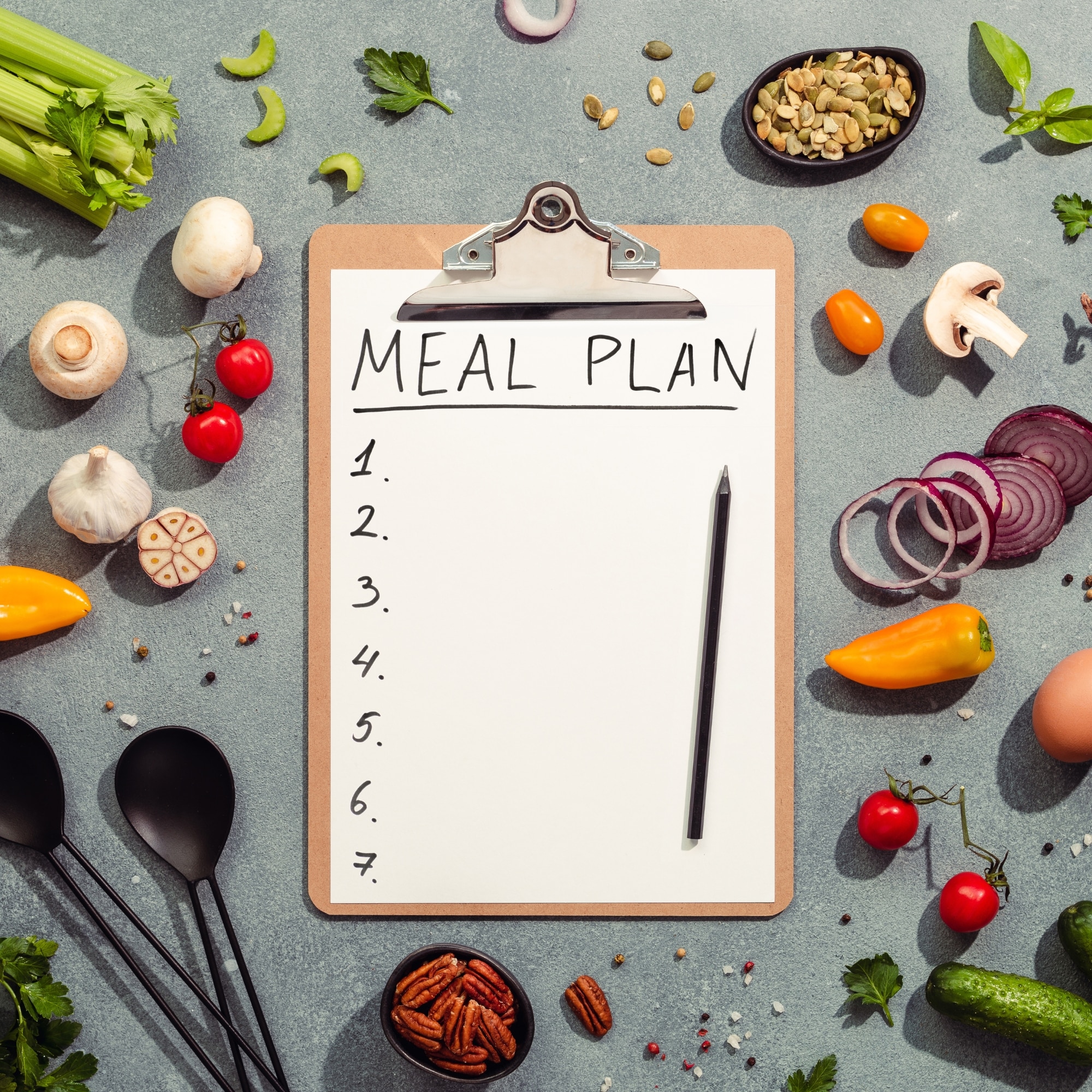
Jump to:
- Key Takeaways
- Benefits of Meal Prepping for CKD
- Key Components of Kidney-Friendly Diets
- Strategies for Realistic CKD Meal Plans
- Importance of Documentation in Meal Planning
- Accounting for Every Meal and Snack
- Diet Significance in Stage 3 CKD
- Practical Tips for Efficient Meal Prepping
- Top Kidney-Friendly Meal Prep Recipes
- Sample Meal Plan
- Extra Considerations for CKD Meal Prep
- Frequently Asked Questions
- Keeping It Simple Makes CKD Meal Plans More Realistic
- For more meal ideas click here to get 7 free dinner meals for your stage of CKD!
Key Takeaways
- Keep meal plans simple by choosing recipes with fewer ingredients and less cooking time for a kidney diet
- Do prep work ahead of time, such as peeling and cutting vegetables in bulk
- Store ingredients for slow cooker meals in one bag for easy cooking
- Shop with a detailed shopping list to avoid buying unnecessary items
For More Recipes and Ideas --->> Get Your Free Meals and Recipes That Are Perfect for Pre-Dialysis Diets, Pre-Dialysis with Diabetes, or Dialysis Diets.
Benefits of Meal Prepping for CKD
Meal planning and prepping offer various dietary benefits for individuals managing chronic kidney disease (CKD).
- Controlled Nutrient Intake: Planning meals allows careful monitoring of nutrient intake, essential for CKD management, such as controlling phosphorus, sodium, potassium, and protein levels.
- Portion Management: Preparing meals in advance aids in controlling portion sizes, ensuring adherence to recommended serving sizes and preventing overconsumption of restricted nutrients.
- Reduced Stress: Planning meals in advance reduces daily stress related to deciding what to eat, especially when following a special diet, enhancing compliance and consistency.
- Healthier Choices: Thoughtful meal planning encourages the inclusion of kidney-friendly items, such as fruits, vegetables, lean protein sources, and whole grains, supporting overall kidney health.
- Budget and Time Management: Preparing meals in bulk can be cost-effective and time-saving, especially when utilizing seasonal produce and purchasing items in bulk, facilitating healthier choices while minimizing expenses and time spent on daily meal preparation.
Overall, meal planning and prepping promote adherence to a kidney-friendly diet, facilitating better management of CKD and promoting overall health.
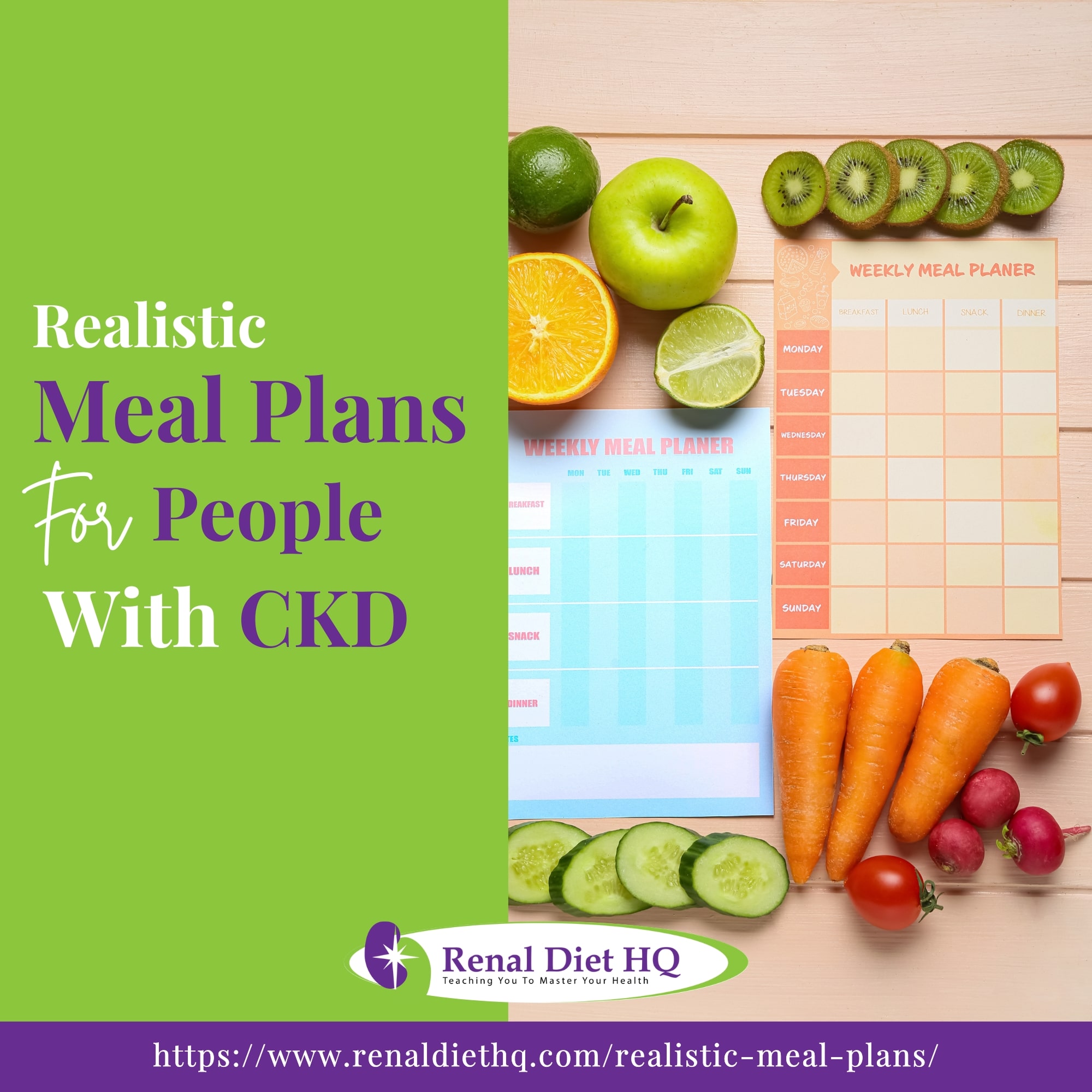
Key Components of Kidney-Friendly Diets
A kidney-friendly healthy eating plan's dietary goals include managing the intake of certain nutrients to alleviate stress on the kidneys and maintain overall health. This special diet typically involves controlling specific components that could burden the kidneys. There are different restrictions for different stages of kidney disease.
- Sodium Restriction: Limiting amounts of sodium. in food helps manage blood pressure levels and fluid buildup. Excess sodium strains the kidneys by forcing them to work harder to eliminate the surplus. Processed foods, canned foods, and condiments are often high in sodium.
- Phosphorus Control: Kidneys struggling to function properly struggle to regulate phosphorus levels. High phosphorus can cause bone disease and affect heart health. Dairy, nuts, seeds, and processed foods contain high levels of phosphorus, requiring moderation.
- Potassium Management: Imbalanced potassium levels can lead to heart irregularities. Fruits, vegetables, and certain legumes are rich in potassium, hence, regulating their dietary intake is crucial.
- Protein Moderation: Protein metabolism generates waste products that healthy kidneys can process. However, in CKD, protein waste can accumulate. Moderating levels of protein can help ease this burden while ensuring necessary nutritional needs are met.
- Fluid Restriction: In advanced stages, fluid intake may need monitoring to prevent extra fluid retention, swelling, and increased blood pressure levels for people with kidney disease.
By managing these components, a kidney-friendly diet aims to support kidney function, control associated complications, and maintain overall health for individuals with kidney disease. Professional guidance from a registered kidney dietitian or health care provider is crucial to tailor these restrictions according to individual needs and stage of kidney disease.
Strategies for Realistic CKD Meal Plans
A realistic kidney disease meal plan revolves around balancing nutrient intake while limiting phosphorus, sodium, and potassium. It typically includes:
- Portion Control: Controlling meal portions helps manage protein intake while reducing phosphorus load. Opt for lean protein sources like poultry, fish, or egg whites.
- Vegetables and Fruits: Select low-potassium fresh food like vegetables and fruits like cauliflower, bell peppers, apples, or berries. Cooking methods like leaching or soaking can further reduce potassium content.
- Whole Grains: Incorporate whole grains like white bread, rice, or pasta to minimize phosphorus intake.
- Fluid Intake: Monitor fluid intake as per individual needs, considering fluid restrictions. Beverages with higher levels of sodium should be limited.
Strategies for realistic CKD meal plans involve:
- Consultation: Work with a registered dietitian specializing in kidney health to create a personalized meal plan aligned with dietary restrictions and individual health needs.
- Balanced Choices: Focus on varied, flavorful recipes using kidney-friendly foods. Experiment with herbs and spices to enhance flavor without adding sodium.
- Preparation Techniques: Learn cooking methods like leaching, soaking, or draining to reduce levels of potassium and phosphorus content in foods.
- Adaptability: Embrace flexibility in meal planning, understanding that some days might require adjustments based on health status or changing needs.
- Regular Reviews: Regularly review and adjust the meal plan with healthcare providers to align with changing kidney health needs or treatment adjustments.
Importance of Documentation in Meal Planning
Documentation is pivotal in planning renal diet meals, ensuring precision, consistency, and effective management of chronic kidney disease in kidney patients.
- Accuracy and Precision: Documenting meal plans, including portion sizes, nutrient content, and ingredient choices, ensures accuracy in adhering to dietary restrictions. It aids in tracking phosphorus, potassium, sodium, and protein intake, crucial for kidney health.
- Personalization: Detailed documentation allows for personalized meal plans tailored to individual kidney function, dietary needs, and health status. It enables dietitians to make informed recommendations aligned with the patient’s specific requirements.
- Consistency and Monitoring: Records enable consistent adherence to dietary guidelines and permit ongoing monitoring of nutrient intake. This documentation helps identify patterns, track progress, and make necessary adjustments in the diet plan as CKD progresses or treatment changes.
- Patient Empowerment: Documented meal plans empower kidney patients to self-manage their diets. It provides a clear outline of permissible foods, portion sizes, and cooking methods, aiding people with kidney disease in making informed kidney friendly choices and adhering to dietary restrictions independently.
- Communication and Collaboration: Documented meal plans facilitate effective communication between healthcare providers and patients. They serve as a reference point during consultations, fostering collaboration and enabling comprehensive care in managing CKD.
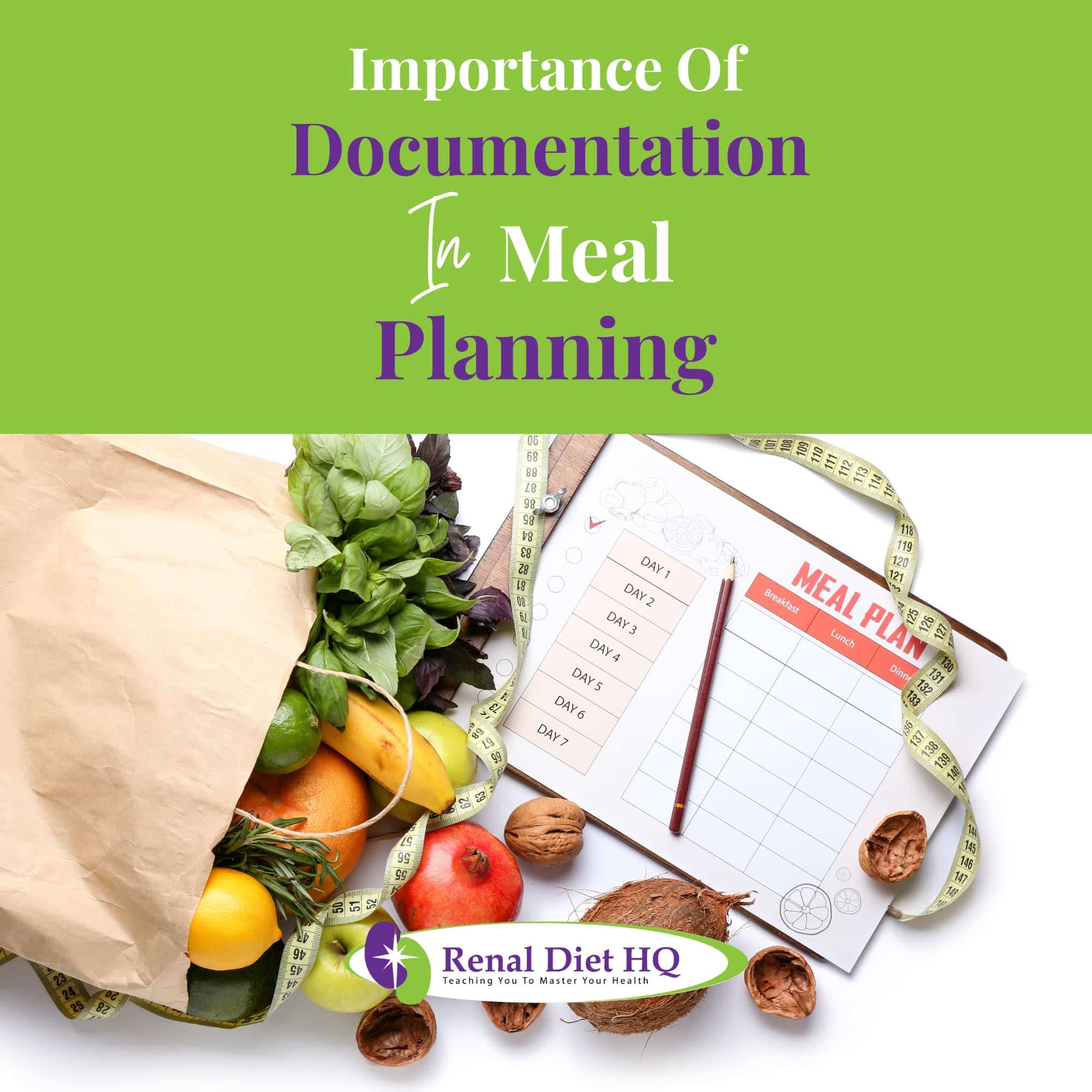
Accounting for Every Meal and Snack
Monitoring every intake, including meals, snacks, and water consumption, is crucial in a renal diet due to its direct impact on kidney function for people with kidney disease. Every morsel consumed contributes to the body's waste load, and for compromised kidneys, managing this load is pivotal in a healthy diet.
Meal components like sodium, phosphorus, potassium, and protein require meticulous monitoring. Balancing these nutrients ensures the kidneys aren't overwhelmed by waste buildup, which could otherwise lead to complications.
Snacks, often overlooked, can add up in terms of nutrient intake. Unchecked snacks may introduce excessive phosphorus or extra potassium, challenging kidney function. Similarly, water intake affects hydration status and electrolyte balance, necessitating careful monitoring to prevent fluid buildup or dehydration.
Precision in tracking these elements aids in maintaining optimal kidney health and function. This level of detail empowers individuals to make informed dietary choices, adjusting meal plans and snack options accordingly. Ultimately, such vigilance supports kidney health and minimizes the risk of complications associated with renal conditions.
Diet Significance in Stage 3 CKD
Stage 3 Chronic Kidney Disease signifies moderate kidney damage with a Glomerular Filtration Rate (GFR) ranging between 30-59 mL/min/1.73m². At this stage, kidneys show reduced efficiency in filtering waste and excess fluids, leading to potential complications like electrolyte imbalances and fluid buildup for a chronic kidney disease diet.
Diet plays a pivotal role in mitigating progression of kidney disease at this stage. Controlling nutrient intake, particularly sodium, phosphorus, and potassium, is crucial. Restricting sodium helps manage blood pressure levels and fluid retention, while limiting phosphorus and potassium reduces strain on the kidneys.
Moderating protein intake, typically 0.6-0.8 grams/kg/day, supports kidney function by minimizing waste production.
A kidney-friendly diet often emphasizes whole foods, fresh fruits, vegetables, and lean protein foods while limiting processed and high-phosphorus foods. You can use this kidney friendly pasta sauce to spice up your dishes instead of tomatoes. Adequate hydration is also vital, though water intake may require moderation based on individual kidney function.
This dietary approach helps alleviate strain on the kidneys, avoiding faster progression of kidney disease and reducing the risk of complications in stage 3 CKD patients. Regular consultation with a renal dietitian or healthcare professional ensures a tailored diet for optimal kidney health.
Practical Tips for Efficient Meal Prepping
You'll find that meal prepping can significantly simplify your dietary management when living with CKD. It's a timesaving strategy that helps you stick to a kidney-friendly diet without the daily cooking hassle. Be sure to invest in quality storage containers—they'll keep your prepped healthy meals fresh and organized, making your life easier.
Don't underestimate the value of freezing meals for future use. It's a time- and stress-saver, especially on busy days when you can't cook. Utilizing kitchen tools and appliances, such as instant pots or slow cookers, can also expedite your meal preparation process and aide a kidney friendly eating plan.
But remember, it's crucial to label and date your prepped meals. This ensures you're aware of their contents and their freshness. Proper labeling also helps avoid confusion, particularly if you've prepared a variety of dishes.
Don't let CKD overwhelm you or dictate your life. With these meal-prepping strategies, you can efficiently manage your diet while still enjoying delicious and healthy meals. It requires a bit of planning and organization, but it's worth it for the control and convenience it brings to your daily routine.
Top Kidney-Friendly Meal Prep Recipes
Armed with practical meal prepping tips, let's now dive into some top kidney-friendly recipes that you can easily incorporate into your meal plan. Remember, meal planning for kidney disease doesn't have to be a daunting task, it's about wisely choosing what you eat while enjoying a variety of flavors.
- Grilled Lemon Chicken with Summer Squash: Marinate lean chicken breasts in a low-sodium lemon and herb mixture. Grill alongside slices of summer squash for a tasty, kidney-friendly meal.
- Vegetable Stir-fry with Tofu: Stir-fry a mix of colorful, low-potassium veggies with tofu in olive oil. Season with a low-sodium sauce.
- Quinoa Salad with Fresh Berries: Toss cooked quinoa with fresh strawberries, blueberries, and a light vinaigrette for a refreshing kidney-friendly summer snack.
- Baked Fish with Green Beans: Season a fillet of your favorite low-sodium fish and bake. Serve with a side of steamed green beans.
The importance of diet in stage 3 CKD can't be overstated, and these kidney-friendly meal prep ideas help ensure you're eating right. With these realistic meal plans for CKD, you're well on your way to managing your kidney health deliciously and efficiently.
Sample Meal Plan
Here's a comprehensive one-week meal prep plan designed for a renal diet, focusing on nutrient content and its significance:
Day 1:
Breakfast:
- Low-Potassium Pancakes: Prepared with white flour, egg whites, and almond milk instead of regular milk. Served with a small portion of strawberries.
- Highlights: Low potassium due to the use of white flour and controlled portion of strawberries.
Lunch:
- Grilled Chicken Salad: Grilled chicken breast on a bed of mixed greens, cucumber, and a vinaigrette dressing.
- Highlights: Lean protein from chicken, low phosphorus and potassium content in greens and cucumbers.
Dinner:
- Baked Cod with Lemon: Cod fillets seasoned with herbs, lemon juice, and a side of steamed green beans.
- Highlights: Low-sodium, low-phosphorus, and low-potassium content in cod and green beans.
Day 2:
Breakfast:
- Egg White Omelet: Egg whites mixed with spinach, tomatoes, and a sprinkle of low-phosphorus cheese.
- Highlights: High-quality protein from egg whites, low-phosphorus cheese, and low-potassium vegetables.
Lunch:
- Tuna Salad Wrap: Tuna mixed with low-sodium mayo, wrapped in a whole grain tortilla with lettuce and bell peppers.
- Highlights: Lean protein from tuna, whole grain tortilla for fiber, and low-phosphorus veggies.
Dinner:
- Turkey Meatballs with Pasta: Turkey meatballs made with breadcrumbs and served with white pasta and a side of asparagus. (Is asparagus good for your kidneys?)
- Highlights: Lean protein from turkey, low sodium and potassium in asparagus, controlled portion of white pasta.
Day 3-7:
Continue with similar meal patterns but diversify protein sources (chicken, fish, tofu), vegetables, and grains to ensure a variety of nutrients while maintaining low phosphorus, potassium, and sodium levels.
Snacks:
- Apple Slices with Almond Butter: Provides a low-potassium snack option.
- Air-popped Popcorn: A low-phosphorus, low-sodium snack alternative.
Hydration:
- Infused Water: Use cucumber, lemon, or mint to add flavor to water without increasing potassium.
Considerations:
- Cooking Methods: Utilize grilling, baking, or steaming to minimize sodium and potassium content.
- Portion Control: Manage protein intake and limit phosphorus and potassium by controlling portion sizes.
- Nutrient Tracking: Monitor ingredients' nutritional content to ensure compliance with dietary restrictions.
- Professional Consultation: Seek guidance from a renal dietitian to tailor the meal plan to individual needs and make necessary adjustments.
Extra Considerations for CKD Meal Prep
Managing meals for Chronic Kidney Disease involves extra considerations, especially when navigating various situations like eating out, snacking, leftovers, holidays, and grocery shopping.
When dining out, you can still make sound choices at restaurants by opting for places with healthy options or asking for substitutions to lower sodium and phosphorus content in meals is beneficial, as well as lower food waste. Checking nutritional information through online restaurant guides, using apps, or asking the restaurant staff can help in making informed choices.
Snacking smartly involves choosing low-phosphorus options like popcorn, pretzels, or fresh fruits, keeping portions in check to maintain nutritional balance. Regarding leftovers, it's crucial to refrigerate or freeze promptly to maintain freshness and avoid bacterial growth.
During holidays, planning ahead by coordinating meals with the host, bringing kidney-friendly dishes, and monitoring portion sizes can help maintain dietary restrictions without missing out on the festivities.
When grocery shopping, reading labels for phosphorus, sodium, and potassium content, and preferring fresh produce over processed foods is advisable. Opting for low-phosphorus dairy or protein alternatives is beneficial. Overall, these considerations support adherence to a kidney-friendly diet, allowing flexibility while ensuring nutritional goals are met in various social, snacking, and shopping situations.
Consulting a renal dietitian for personalized guidance is essential in navigating these circumstances successfully.
Frequently Asked Questions
Common challenges for CKD patients adhering to meal plans include managing limited protein intake, monitoring phosphorus and potassium levels, and controlling sodium intake. Balancing these nutrients while ensuring variety and palatability in meals can be demanding.
Additionally, restrictions on favorite foods, navigating social situations, and maintaining consistency in meal planning can pose dietary challenges. Adapting to these dietary changes requires discipline, education, and continuous support from healthcare providers or dietitians to sustain a kidney-friendly diet effectively.
In advanced kidney disease stages, nutritional requirements shift due to declining kidney function. Initially, protein and electrolyte restrictions might be moderate to ease strain on the kidneys. In later stages, protein needs can vary—either decrease due to reduced kidney function or increase to counter muscle wasting. Phosphorus and potassium control becomes more stringent.
Fluid intake might be limited to manage fluid buildup. Individualized dietary adjustments are crucial for a healthy balance of your nutritional needs and kidney health as CKD progresses. Regular monitoring and guidance from healthcare professionals are pivotal.
Several resources aid kidney patients in meal planning and tracking of key nutrient. Renal dietitians offer personalized guidance, tailoring diets to individual needs. Smartphone apps like MyFitnessPal or Lose It! facilitate food tracking, assisting in monitoring nutrient intake.
Websites such as the National Kidney Foundation offer meal planning tips specific to CKD. Additionally, food scales, portion control tools, and renal-specific cookbooks streamline meal preparation and ensure adherence to dietary guidelines.
Keeping It Simple Makes CKD Meal Plans More Realistic
Meal planning and prepping significantly benefit those managing chronic kidney disease by offering controlled nutrient intake, reducing stress, promoting healthier choices, and managing your valuable time and budget effectively.
These plans revolve around managing sodium, phosphorus, potassium, protein, and fluid intake while ensuring portion control and balanced choices. Detailed documentation empowers precision and personalization in meal plans, fostering consistency and patient empowerment. Precise tracking of meals, snacks, and water intake plays a pivotal role in maintaining optimal kidney health.
In stage 3 CKD, dietary strategies focus on mitigating strain on the kidneys, while efficient meal prepping and extra considerations for various scenarios enhance adherence to a kidney-friendly diet.
With the right strategy, you can meet your health goals and enjoy a lot of long-term benefits through an optimized and realistic meal plan for kidney disease. Not only will you have tasty meals everyday while managing your daily intake of essential nutrients, but your will also surely improve your quality of life, even as you live with renal disease.
For more meal ideas click here to get 7 free dinner meals for your stage of CKD!
Want more help creating and managing your chronic kidney disease diet? Try reading my book -
Create Your Own Kidney Diet At Amazon




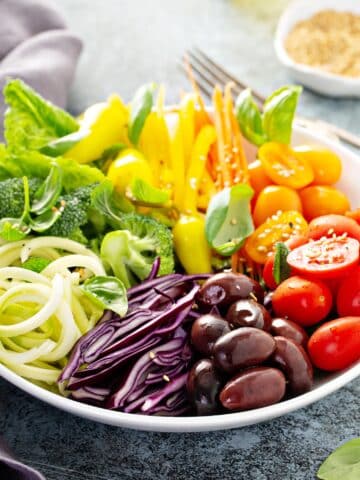
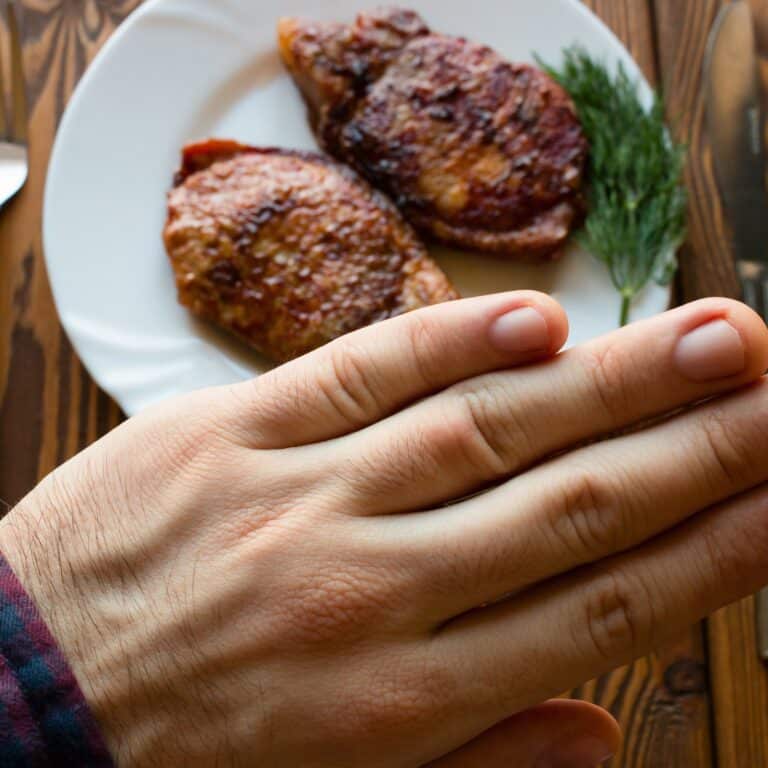
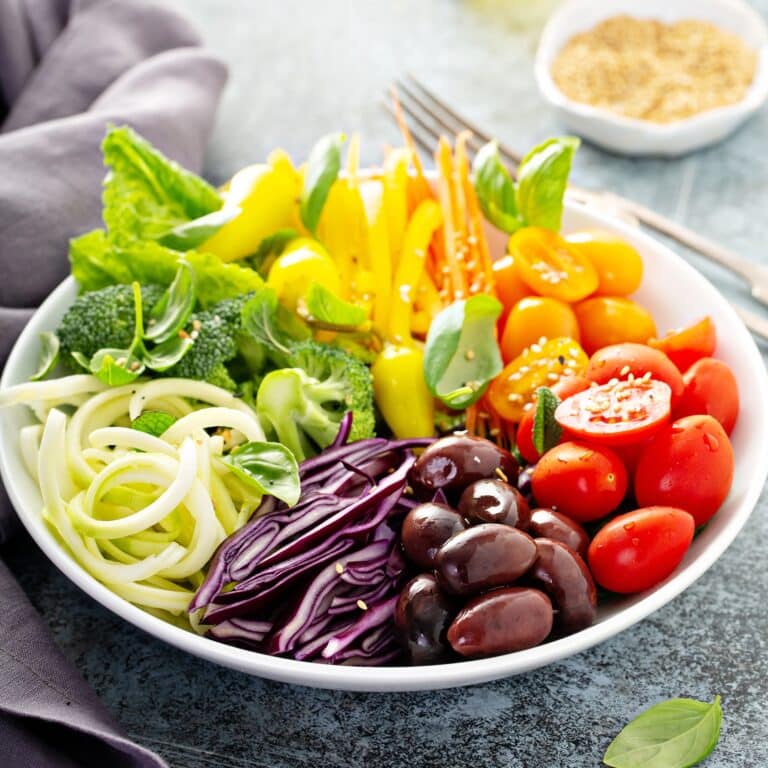
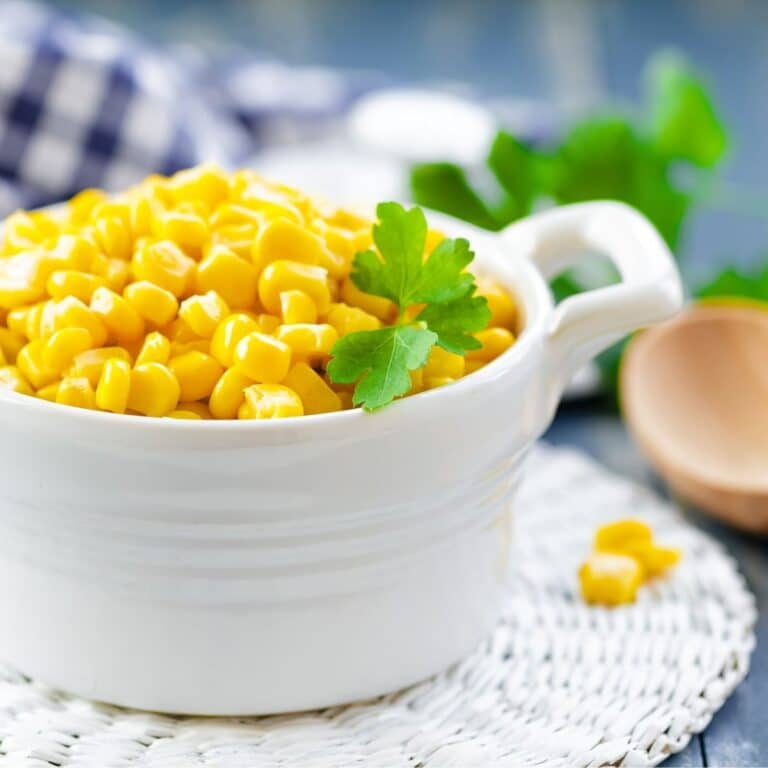
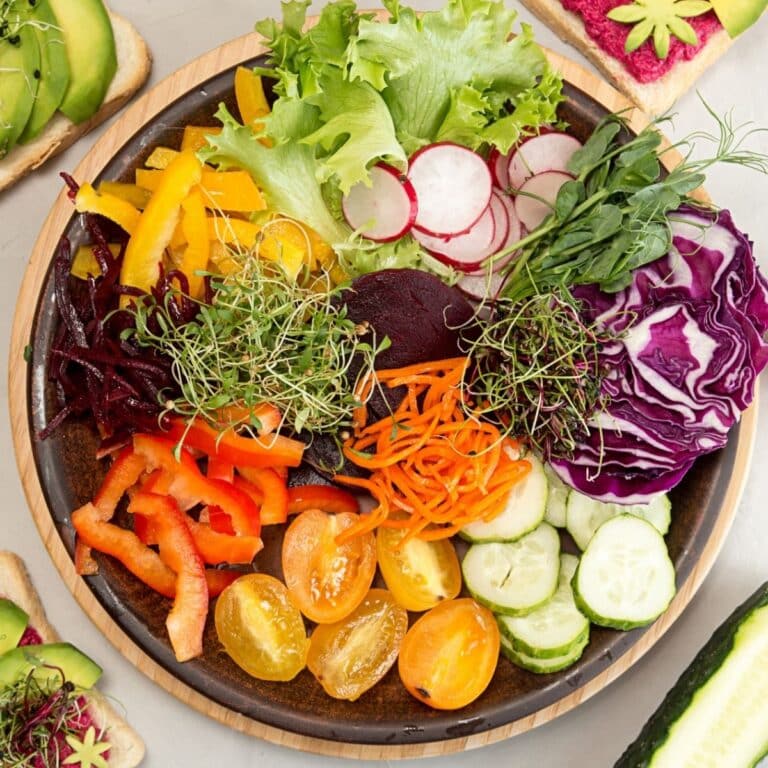

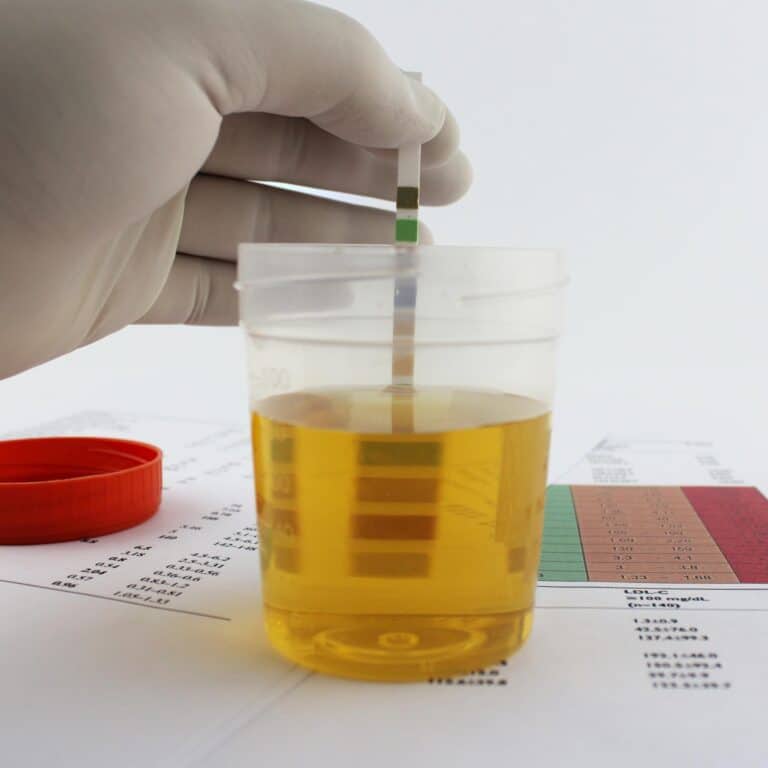


Hello, I am trying to help my mom who just started dialysis. Is the dialysis digest different from the pre-dialysis diet?